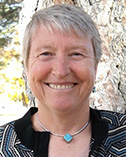
Jayne Belnap
U.S. Geological Survey
|
Primary Section: 63, Environmental Sciences and Ecology Secondary Section: 64, Human Environmental Sciences Membership Type:
Member
(elected 2021)
|
Biosketch
Jayne Belnap is an ecosystem ecologist known for her work in dryland regions. She pioneered the study of biological soil crusts as critical components for the stability and fertility of dryland soils. She has worked extensively with private and government land managers in these landscapes, with her efforts substantially changing how lands are managed and conserved in many drylands globally. In addition, her extensive communication with various audiences have elevated deserts as a landscape of value in the public’s eye. Belnap was born and raised in Salt Lake City, UT. She graduated from UC Santa Cruz with degrees in Biology and Natural History (1980), obtained a Master’s degree in Ecology from Stanford University (1983) and received her PhD in Botany and Range from Brigham Young University (1991). Belnap is the past president of the international Soil Ecology Society. She is past chair of the Ecological Society of America’s (ESA) Soil Ecology section and served on the governing board as member-at-large and vice-president for science. She received the “Outstanding Women in Science” award from the US Department of Interior. In 2012, Scientific American magazine profiled her career. She is a Fellow of ESA and of the American Geophysical Union. She is currently a member of the National Academy of Sciences.
Research Interests
Jayne Belnap’s research has focused on dryland ecosystems. Because land use can reduce the fertility and stability of these ecosystems, her main research has been on how these lands can be managed sustainably while still used for human purposes (e.g., grazing, recreation, and/or energy/mineral acquisition). Specifically, her seminal work in dryland regions has resulted in an entirely new subfield of ecology, biological soil crusts. She and others have shown these communities to play a critical role in increasing the stability and fertility of soils and influencing local to global hydrologic cycles. She has also been actively engaged in studies on how climate change will affect drylands ecosystems and in developing adaptation options for people using and managing these lands. Dr. Belnap has been involved in many creative and successful restoration efforts aimed at reducing soil erosion and restoring plant productivity using local materials and labor. Her research has been conducted, and informed management and policy around the world, including Argentina, Antarctica, Australia, Chile, China, Ethiopia, Iceland, Kenya, Mexico, Mongolia, Namibia, South Africa, Tanzania, the western U.S., and Zimbabwe. She has trained numerous federal, state, and private land managers/pastoralists and policy makers on best management practices for ecosystems in dryland regions.

